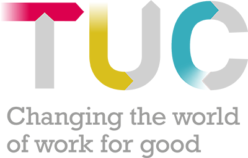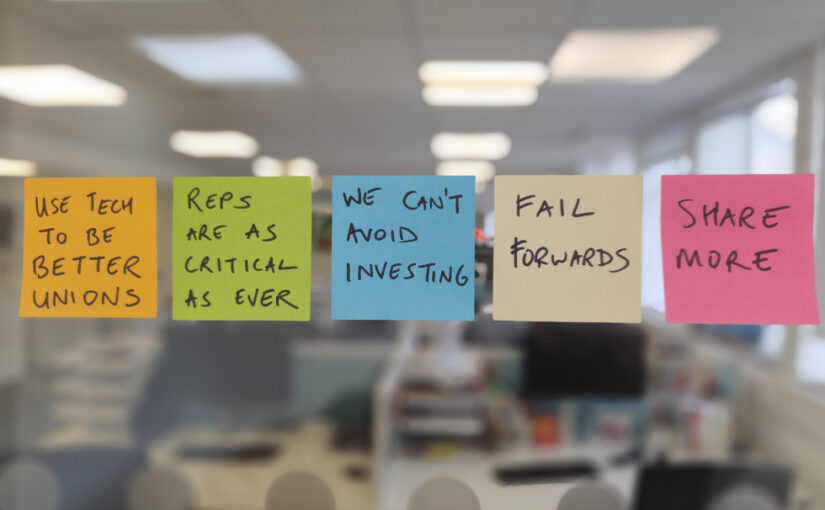Since the start of the TUC’s Digital Lab project in 2019, my NEU Joint GS colleague Mary Bousted and I have shared the newly created role of lead members for digital change on the TUC’s Executive Committee.
We’ve talked with other union leaders about this on many occasions, as well as trying to take forward a big programme of digital change within NEU.
We’ve been really proud of the work our union has been able to achieve over the last years, responding digitally to member needs during the pandemic, and culminating in organising tech that helped us beating the strike vote thresholds twice in national ballots in the last year.
I’m obviously not taking credit for doing this work myself. We’ve got fantastic staff specialists in our union who worked hard to deliver it. But I think leaders in our unions do have a really important role to play around digital change. That involved setting visions, developing strategies, creating space for change, monitoring delivery, and supporting our people with what they need to get the difficult tech work done.
As the two of us step down, I think we’re leaving NEU in a positive place on digital change. Something that I’m confident our brilliant staff, reps and new leadership with Daniel Kebede will be in a good place to take even further.
I’ve learned a lot too, and I’d like to outline five thoughts which have driven my own thinking about leadership and digital, and the way leaders have to approach tech in our unions.
We have to use tech to be better unions
First of all, it’s easy to focus on claims that digital is there to make efficiencies. You could save loads of money on your HR, it’ll make your casework easier, member enquiries can be automated, and so on. That’s all true, and it does matter. But for me, the central thing is you can use tech to help the union do more – especially to organise more effectively, to campaign more effectively.
That’s where union leaders and exec members have to focus the vision. How can we use this digital to make our union stronger? Tech startups have it easy. They just have to make something that their users like and that is financial sustainable. But if we stop at that, we end up just servicing our members, not organising them.
Everything we do in tech has to consider the organising angle. Yes, let’s make some savings as well. But union tech done well doesn’t mean your union no longer has to do the hard work – it lets you do more of it.
Our reps are as critical as ever
Tech is never going to replace the connection and conversation between a rep and a member. So at NEU, we’re trying to build the tech that will help the rep have those conversations in new ways, rather than trying to bypass reps with tech that centralises or automates.
You can use tech to get horizontal communication going between reps too, and provide training and resources – really building up how effective they’re able to be across the union. And that’s where our core strength lies – being present in every workplace we can. Don’t think that if you have AI you won’t need good reps just as much as you do now.
We can’t avoid investing
This may be a hard thing to say, given that unions are in difficult financial positions, but we’re going to have to find resources to do more here. And one key point for leaders is not to view digital as being a new cost to the union.
Just like we say to the government about education. We say “don’t see it as a cost, see it as an investment in the future of the country”. New digital tools can be a lot of money, and money in cost centres you’re not used to spending on. But see it first and foremost as the investment you’re making in the future of the union.
Fight for a budget for tech development in your union. You very probably need more money on it than you currently spend.
Fail forwards
My next point is that tech projects fail. They fail a lot. And that’s okay. Our teams at NEU have done some brilliant work, but we’ve also done our fair share of things that didn’t come off the first time, or might not have worked at all.
You’ve got to tell your tech staff who are working on it, it’s alright to experiment. And when you experiment, things go wrong. It’s alright to be in that place, so long as you make sure you learn from it and improve.
Get in a position where you’re trying to fail as early in the project as possible. Try to identify what’s not working, as early in the project as you can. That way you can save the project, correct it to improve, or know that it’s time to try another project instead.
Fail early, but don’t be afraid of failure, because if you’re afraid of failure, you’ll be afraid of experimentation, and you’ll never get ahead.
Share more
And my last point is a hard one for union leaders. We need to get better at sharing with each other.
We’re all union patriots. We all love the union we lead and we want it to succeed more than anything.
But all unions are in a hard place. The capitalists don’t like us. The government doesn’t like us. We don’t have the resources we want to be able to commit to digital – certainly less than the employers we’re facing.
And that means we’ve got to learn to love one another a bit more. We have to share our ideas and the evidence we’re discovering between all our unions in the movement. The movement gives us strength in many ways, and getting to the cutting edge of digital unionism is one of those things that none of us can do alone.
Kevin Courtney is former Joint General Secretary of the NEU

